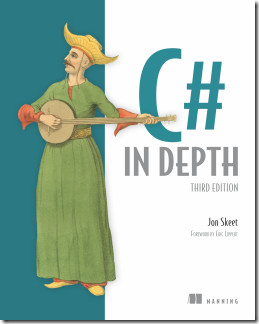November 27, 2015 .NET, Book Reviews, C#
 I’ve been writing C# code for more than 10 years by now and yet had a lot to learn from the book.
I’ve been writing C# code for more than 10 years by now and yet had a lot to learn from the book.
The book is written by Jon Skeet (the guy Number One at StackOverflow) and is a purely about the C# language. It distances itself from the .NET framework and libraries supplementing the framework.
Structure of the book follows C# language versions. This isn’t particularly useful if you are trying to learn the language by reading this book after some other introductory book. But for software professionals, though, it could be a joy, since it takes you through your years of experience with the language. It tends to remind you about times when something wasn’t possible and later it became possible. Kind of nostalgia, I would say.
First chapters could be somewhat boring. I read the book cover to cover, since I didn’t want to miss on anything, but probably it isn’t the best way to read the book.
Jon is very pedant when it comes to defining anything. This, of course, is double sided: very good when you have strong knowledge and understand components of the definition, but, unfortunately, it complicates understanding. There were some places in the book which I had to read few times to completely understand. Just for instance, in a chapter about Covariance and Contravariance:
[…] the gist of the topic with respect to delegates is that if it would be valid (in a static typing sense) to call a method and use its return value everywhere that you could invoke an instance of a particular delegate type and use its return value, then that method can be used to create an instance of that delegate type.
On the other hand, I found it very important that details are not omitted. I was reading the book for the depth of it. So details and preciseness is exactly what I was expecting, even though they come with the price of slower comprehension.
You may have different background than I do, but if you are a .NET developer with some years of experience, chances are the only chapters with new and difficult information will be those that are not reflecting everyday practical usage of C# language. For example, all of us use LINQ these days, but very few of us would need to know how it works internally or need to implement their own LINQ provider. Very few of us would dig into DLR or how async/await is working.
Almost in each and every chapter there was something where I could add to my knowledge. For me the most important chapter to read was “Chapter 15. Asynchrony with async/await”, since I have very limited experience in this feature.
Conclusion
In my opinion, the best two books ever for C# programmers are “CLR via C#” and “C# in Depth”, meaning that I just added one to this list.
“C# in Depth” is a great, precise, and thorough book to complement and enrich your knowledge.
I highly recommend reading it.

codemore code
~~~~